Faith. Will. Power: Astrology, Hypnotism and Animal Magnetism in the 19th Century
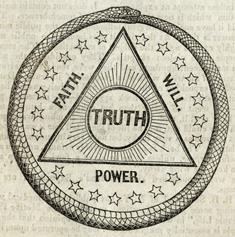
Many people highly educated individuals in the 19th century conducted scientific inquiries into astrology, hypnotism, and mesmerism. Then, as now, people were divided in their convictions and beliefs regarding these subjects. In the following selections of pamphlets extolling or condemning these phenomena, hypnotism and mesmerism, which was also called animal magnetism, sometimes seem interchangeable, while astrology appears independent of the others.
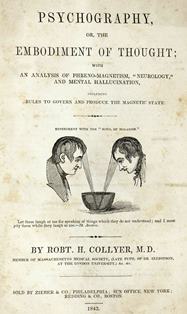
Psychography, or, The Embodiment of Thought; with an Analysis of Phreno-magnetism, “Neurology,” and Mental Hallucination, including Rules to Govern and Produce the Magnetic State by Robt. H. Collyer, M.D. (1843)
Robert Collyer was an advocate and practitioner of phrenology, a method of analysis based on the belief that mental capacities and character traits can be determined by the configurations of the skull. This conviction led him rapidly to embrace “the Mesmeric truth.” He relates his first attempt to magnetize a young lady who had previously refused his offers to conduct a phrenologic examination. By his account the results of this magnetization were astonishing. Within “ten minutes she was thrown into a congestive or mesmeric condition.” Consequently, Collyer was able to “touch on the organs of self-esteem, combativeness, mirthfulness &c.”
Collyer also recounts, without false modesty, many of his achievements in the emerging field of psychography, including the “bowl of molasses.” experiment. This interesting investigation is strikingly illustrated by a drawing of two gentlemen staring intently into a large bowl with lines drawn from their foreheads converging in the bowl, the lines seemingly meant to indicate the mesmeric power emanating from their brains.
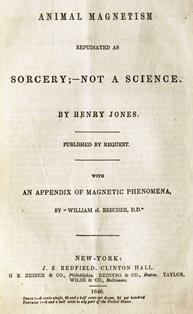
Animal Magnetism Repudiated as Sorcery;—Not a Science. By Henry Jones. Published by Request With an Appendix of Magnetic Phenomena, By "William H. Beecher. D.D." (1846)
Henry Jones sets out headlong in this publication to denigrate animal magnetism and assign to it the mark of the Devil. His opening argument is preceded by two verses from the Book of Revelations regarding unclean spirits and false prophets. He elucidates this text by stating, “Therefore, in the present discourse, Mesmerism will be regarded, not as among the Sciences at all, nor as a mere human imposition, but as Sorcery, or the mysterious works of 'unclean spirits,' or the spirit of Satan the false prophet, especially in its most astonishing works of 'Clairvoyance,' so called, however it may be considered in its other, less wonderful exhibitions.”
Jones includes an appendix by Reverend William Beecher who recounts first-hand experiences observing animal magnetism, and concludes:
…that as a remedial agent, Mesmerism is yet to accomplish much good; and no harm can result from it except, like all other blessings, it be abused.
In appreciating Beecher's phlegmatic observations, it is worth considering that he was the least successful among his striving siblings who included Harriet Beecher Stowe and Henry Ward Beecher. Referred to as “The Unlucky,” the dyspeptic preacher wrote of his wedding day:
Was married... No company, no cake, no cards - nothing pleasant about it.
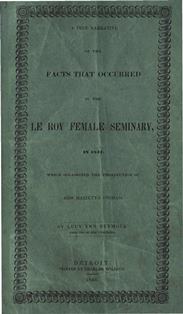
A True Narrative of the Facts that Occurred in the Le Roy Female Seminary, in 1842, which Occasioned the Prosecution of Miss Marietta Ingham by Lucy Ann Seymour (1846)
This pamphlet unveils the mystery surrounding a series of thefts that occurred at boarding school for young women. The story is told by a disinterested party sometime after the events. The thefts of money, thimbles, watches and other items of value created a tense environment within the school, giving rise to rumors and suspicions that threatened the school’s future and stained its reputation. The narrator spares presents a vivid picture of the time and place and the effect of the events on the community. Most intriguing is the assertion that the thefts occurred under the influence of mesmerization or hypnosis. How are the criminal acts of an individual to be understood if one believes the person was mesmerized? Who is responsible? Crime by hypnosis posed legal and moral challenges to the contemporary thinking of that time.
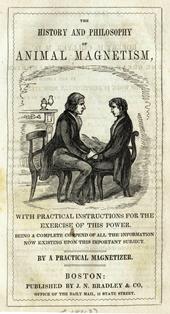
The History and Philosophy of Animal Magnetism, with Practical Instructions for the Exercise of this Power. By a Practical Magnetizer (1843)
The author dedicates this pamphlet to Dr. Robert H. Collyer who was the author of the first pamphlet in our selection above. In his introduction, the anonymous writer states that “His intention was, not to convince the skeptical, but to inform the candid.” He provides a brief history of mesmerism in America and the failure of some of its early practitioners to successfully advocate for it…until Dr. Collyer, that is. Granting that Collyer was “somewhat peculiar in his public discourses, and somewhat eccentric in his general character,” he argues that Collyer's “burning enthusiasm and his dauntless energy of character” rendered him absolutely qualified to be an “advocate of Mesmerism, which excites at once the strongest prejudices and fiercest opposition of all classes of society.” This tract is a wholehearted and detailed account of the power of mesmerism, the growing number of respectable practitioners, and the promise that this “mysterious and intricate science” holds for everyone.
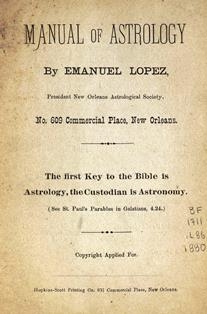
Manual of Astrology by Emanuel Lopez, President New Orleans Astrological Society No. 609 Commercial Place, New Orleans (1880)
On the title page of this manual Emanuel Lopez includes the following: “The first Key to the Bible is Astrology, the Custodian is Astronomy. (See St. Paul's Parables in Galatians, 4.24.)”
Perhaps the details that Lopez reveals within this pamphlet can be evaluated by a contemporary practitioner of astrology; the layperson, however, may find many of his assertions confusing, and the cynic may find them risible. As an example, Lopez writes, “Moon in Conjunction to Mars. Stomach constantly deranged; stubborn; turbulent, rash, indiscreet; plunging headlong into good or evil; debaucher; squander money and health; not truthful, but brave, generous, intelligent; make bad, drinking husband or wife; unhealthy, vexatious and may run into disgrace.”
There is much more along these lines, including information about Neptune which “rules the olfactory” and is “the invisible god of the Heathens.” Neptune’s effects on each of the zodiac signs are revealed. As an example,
In Virgo, crazy of enthusiasm, with violets at his nose or bouquets in hands; lives in ecstasy; becomes like a girl, and girls become angels; very chaste.
For more information about American Pamphlets, Series 1, 1820-1922: From the New-York Historical Society, or to request a trial for your institution, please contact readexmarketing@readex.com.



